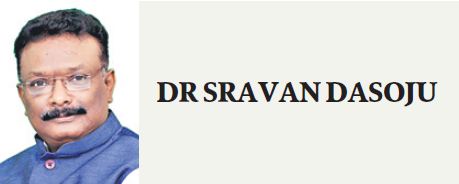Posted on – Tue, 11/22/22 at 12:37am

Need for caste-based census to determine OBC population size is pending and valid
Written by Dr. Sravan Dasoju
The Other Backward Classes (OBC), the productive class of India that plays a key role in nation building, has been oppressed and exploited for decades. The OBCs, which make up about 56% of India’s population, are not getting their fair share of education, employment and political opportunities even after 75 years of independence. It is very shocking that the OBCs are even deprived of the existing reservations prepared for them in the fields of education and employment. Caste based census is the only way to stop OBC from being exploited again and again.
There is an ongoing and valid need for a caste-based census to determine the size of the OBC population. How can the government formulate plans and implement welfare measures for the needy when the government does not even know or understand the living conditions, suffering, pain and needs of the people? Just as what cannot be measured cannot be managed, what cannot be counted cannot be cared for.
Mandala Committee
Despite the dominant role caste plays in our social, economic, cultural and political life, it is odd that no reliable data on caste has been available since 1931. Every census of independent India from 1951 to 2011 has published data on Scheduled Castes and Scheduled Castes. Tribes, but not other castes.
The report of the Second Backward Class Committee or Mandal Committee was based on data related to the backward class collected in the 1931 census, and even today the government relies on it. Social, educational, and economic data on the backward classes play an important role in the design and implementation of socioeconomic development policies. In the era of evidence-based public policies, the Modi government lacks concrete data to design sustainable public policies to empower OBCs.
There are data on animals, birds and even non-living things, but unfortunately there is no data on OBC in this country. Therefore, in the absence of constitutional protection, other vulnerable groups face severe discrimination and deprivation of basic rights in society.
After independence, successive governments rejected the request to conduct a caste-based census on dubious grounds. In fact, before the 2019 general election, the then home minister, Rajanath Singh, announced that the 2021 census would include counting all castes. But the current union home minister, Amit Shah, has turned around.
playing politics
However, the BJP, the master of deceitful politics, has been shelving the caste-based census requirement to stifle the rise and empowerment of the OBC. The BJP-led NDA government knows that the census is the responsibility of the central government under Article 7 of the constitution, but irresponsibly pushes the caste census work to the state government, causing serious constitutional confusion and expanding its double standards.
According to official records, there are more than 5000 OBCs in India. But in reality, only 2-5% of these castes are part of the mainstream and have access to education and employment opportunities, as well as political and government benefits, while the majority struggle in abject poverty and total neglect. Even now most of the Backward Class (MBC) and Non-National Nomadic Tribes (DNT) still live like beggars without any social security.
Why is the NDA government led by the BJP at the center, which has advertised time and time again that it has chosen the leader of the OBC as PM, yet shunned to conduct a caste-based census?
Tips from Telangana
The center should take inspiration from the Telangana state assembly, which under the leadership of Chief Minister K Chandrashekhar Rao unanimously passed a resolution for a caste-based census in October 2021 to identify the OBC population. Chandrashekhar Rao made it clear that equality and social justice require the OBC census and urged Modi to act quickly on the issue. Subsequently, other leaders such as Bihar Chief Minister Nitish Kumar, Tamil Nadu Chief Minister MK Stalin, Samajwadi Party leader Akhilesh Yadav and BSP Chairman Mayawati also called for a caste census. However, the Modi government disregards the spirit of social justice and federalism and strongly opposes it.
There is a serious misconception that the Supreme Court of India has imposed a 50% cap on reservations which cannot be exceeded. However, in some cases, the Supreme Court has ruled that in order to increase the retention rate above 50%, a caste census, including socio-economic studies, must be conducted to provide justification.
In the absence of OBC population data, even existing reservations for these vulnerable groups have been rejected or usurped by higher castes. For example, many well-known PSUs, central government organizations, departments, central universities, and higher education institutions do not use OBC reservations.
corrective steps
I have also raised the issue of the OBC’s denial of retention at major central institutions such as the NALSAR School of Law, the English and Foreign Languages University (EFLU), through the National Backward Class Council and the Supreme Court. This is just the tip of the iceberg. Denials of bookings to OBC are more serious and common throughout India. The first step in correcting this injustice and ensuring that OBCs get their due is a caste-based census. If the OBC population is not counted and studied to understand their socioeconomic status, they will not be able to obtain the education and employment opportunities they deserve and live a life of dignity.
Demands for a caste census go beyond politics. Caste is not just a social identity; it is also a way of self-esteem in India. The caste system has persisted in India for years as the world’s most extensive welfare program is being implemented based on caste status. So Prime Minister Modi must realize that denying the caste census is not only an attempt to destroy the career prospects of OBCs but also an attempt to deprive them of their self-esteem, identity and existence, which is a big challenge. betray. In this context, the disadvantaged groups across the country must wake up. If this opportunity is missed, the caste census and justice will have to wait another ten years. Therefore, we must collectively agitate for a full caste census, which is our legitimate constitutional right.

(The author is a Telangana activist)
